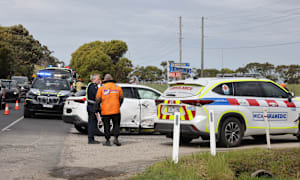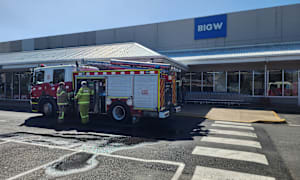THE State Government's Inquiry into Climate Resilience is starting its public hearings phase next week and the first session will be held in Traralgon on Tuesday, December 3.
Members of the community can head along to hear from local councils, Gippsland environment groups, associate professors, farming representatives, and others as they speak to the Legislative Council Environment and Planning Committee about local climate resilience.
Member for Eastern Victoria Melina Bath is a member of the panel chaired by the Member for Southern Metropolitan Ryan Batchelor.
We understand that Bass Coast will be represented at the hearing by council officers, not sure about South Gippsland but given the release last week of the Cape-to-Cape Resilience Plan and ongoing issues of coastal erosion and concerns about inundation locally there would be plenty for both of them to talk about.
However, while the Cape to Cape Resilience Plan released last week says that the percentage of General Residential Zoned (GRZ) at risk of permanent inundation in Inverloch is less than 1% until 2040, then 1% from 2040 to 2100 when it rises to just 2%, if sea level rises by 0.8 metres, it may surprise some to hear that Bass Coast is already considering planning controls and “eventual forced relocation” of private property.
The Bass Coast Shire Council’s Acting General Manager Place Making Donna Taylor has made a submission to the inquiry on council’s behalf listing among council’s initiatives for combating climate change the exhaustive process to establish an independent Environment Fund.
“The major climate change risks to people of the Bass Coast region are rising sea levels, coastal erosion and storm surge that damages coastal foreshore land and community infrastructure and inundates utility networks, drainage systems and private property,” Ms Taylor says in the shire’s submission.
“The impacts to the built environment are lost access to public and private property, loss of public open space to recreate, service disruptions, uninhabitable and undevelopable private\residential land.
“This causes financial losses and impact to:
- Local Government through repair bills, additional infrastructure resilience measures. Utilities with damage and forced relocation of networks.
- Citizens livelihood through property loss, equity loss and eventual forced relocation.
“Additionally, significant risks from changing rainfall patterns and increasing frequency of wild weather causing more storm events with flash flooding rendering stormwater networks ineffective and downed trees that impedes access and damages roads, utilities, and private property.
“This causes losses and impact to:
- Local Government through repair bills and increased emergency response and recovery effort.
- Utility outages, disruptions, and unplanned repair bills.
- Citizens impacted living arrangements and increased Insurance and/or repair bills.
“Our community looks to us (Local Government) to keep them safe. Local Government's current responsibility is to maintain community infrastructure and administer planning controls.
“The expected response to manage impacts to community infrastructure alone will stretch our resources and require financial assistance at times. Our current response for community infrastructure is to increase resilience where possible and retreat in accordance with State coastal policy.
“While this policy may be appropriate for some community infrastructure, for residential land and service infrastructure such as roads and utilities, the policy falls short.
“For example, a recent case study into the climate change risks impacting a section of the Bass Coast community (Inverloch) revealed a suite of response actions and activities required to support and manage the impacted community. These new roles require significantly more resources than our budgets and revenue raising capacity currently provide.
“Our funding and resource gap will grow as climate risks materialise and affect our community further as we understand the impacts across all our service areas, service levels will be reduced, or we risk our financial sustainability.
“Legislative frameworks continue to allow for construction of buildings and infrastructure that are ill-prepared for the weather events predicted to occur as a part of the changing climate. In addition, there is no guidance or legislative requirement to demonstrate how to retro-fit existing buildings and infrastructure.”
Ms Taylor goes on to say that recognising the urgency of climate change, Bass Coast Shire Council has declared a climate emergency and devised a Climate Change Action Plan 2020-30.
“This initiative acknowledges the joint responsibility of the Council and community to reduce emissions, enhance community resilience against local climate impacts, and ultimately mitigate global warming. Alongside this, Bass Coast Shire is a leader in asset management, participating in a range of projects aimed and better understanding and planning for the impact that climate change will have on our diverse portfolio of assets.”
Despite this submission by the shire’s administration, which appears to indicate that decisions have already been made about how to protect the shire’s own assets and also to reduce the risk to private property at Inverloch, the new Cape to Cape Resilience Plan is yet to settle on what measures should be taken. These might include major engineering work such as groynes, breakwaters and seawalls in strategic locations, major dune and beach reinstatement works, and the likes of drainage management and tidal controls at Wreck Creek, for example, that would address periodic threats from storm surge, tidal action and erosion while recognising the low, even negligible risk of permanent inundation of homes and private property.
Bass Coast Councillors contacted by the Sentinel-Times were unaware of the State Government's Inquiry into Climate Resilience hearing at Traralgon on Tuesday or that the shire had made a submission to the inquiry.
The South Gippsland Conservation Society has also made a submission to the inquiry.
- What: State Government's Inquiry into Climate Resilience
- When: Tuesday, September 3, 10am
- Where: Century Inn Traralgon, 5 Airfield Road, Traralgon.
There will also be an ‘Inquiry into Local Government funding and services’ especially as it related to cost shifting from state and federal governments to local council and the ability of local governments to meet core service delivery objectives.
- What: State Government's Inquiry into Local Government Funding and Services
- When: Wednesday, September 4, 10am
- Where: Century Inn Traralgon, 5 Airfield Road, Traralgon.









